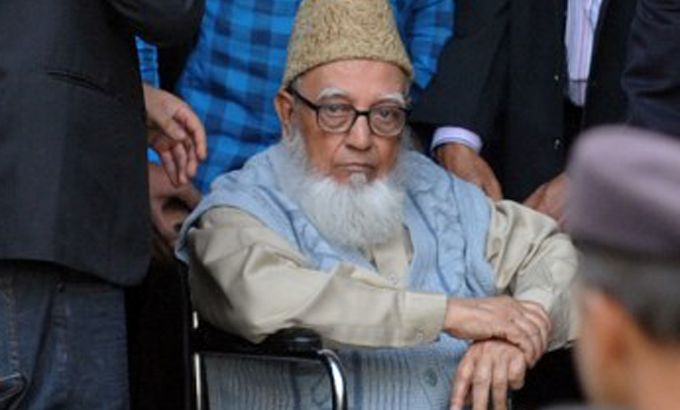Azam found guilty of Bangladesh war crimes
Deadly clashes erupt after Ghulam Azam, spiritual head of Jamaat-e-Islami, given 90 years over war of independence role.

A Bangladesh war crimes tribunal has found a top Islamist party leader guilty of masterminding atrocities during the 1971 war of independence against Pakistan.
Ghulam Azam, 90, the wartime head of the country’s largest Islamic party, Jamaat-e-Islami, and now its spiritual leader, was found guilty on Monday by the International Crimes Tribunal on five charges including murder and torture.
At least three people died in clashes after the verdict was announced. Azam supporters say the trial was politically motivated, while opponents are furious that he was not sentenced to death.
Three tribunal judges announced their verdict in a packed courtroom in the Dhaka. They said that he deserved the death sentence, but a jail term was preferred due to his advanced age and health complications.
Prosecutor MK Rahman said: “Some kind of justice is done, but we are not happy.”
Azam’s lawyer Toby Cadman said in a written statement that the defence team would immediately start in its preparation to mount an appeal. “But with the issuance of this judgment today, the tribunal has lost all credibility in terms of its independence and impartiality,” he said.
The defence argued that, in light of its legal, evidential and fair trial submissions, the prosecution had not proven any of the charges against Ghulam Azam beyond reasonable doubt or at all.
Deadly violence erupts
Deadly street violence erupted across Bangladesh before and after the judgement, handed down by the International Crimes Tribunal.
In Dhaka, Azam supporters used homemade bombs in clashes wirh police, who fired baton rounds.
Local media said that at least three Jamaat-e-Islami activists were killed in Bangladesh on Monday.
Two were beaten to death by opposition activists in southwestern Kushtia district as they tried to block a road. One was killed in northwestern Chapainawabganj district when paramilitary border guards opened fire after a bomb was thrown at police.
Police also fired baton rounds at protesters in the cities of Bogra, Comilla and Rajshahi after activists went on the rampage, attacking and burning dozens of vehicles, police officials told AFP.
Strike call
Jamaat, a key member of the opposition, called a nationwide strike on Monday to protest against the verdict, saying the war crimes trials were aimed at eliminating its leaders.
|
|
| Azam’s lawyer lashes out on Al Jazeera against war crimes verdict |
Bangladesh has said that the Pakistani army killed three million people and raped 200,000 women with the assistance of local collaborators during the war.
Prosecutors had sought the death penalty for Azam, describing him as a “lighthouse” who guided all war criminals, and the “architect” of the militias which committed many of the 1971 atrocities.
When India intervened at the end of the nine-month war and it became clear Pakistan was losing, the militias killed dozens of professors, playwrights, filmmakers, doctors and journalists..
Azam was described as the “mastermind” of the massacres of the intellectuals. Many of their bodies were found a few days after the war at a marsh outside the capital, blindfolded and with their hands tied behind their backs.
Azam is the fifth person convicted by the International Crimes Tribunal. Three people have been sentenced to death for their role and one was given life imprisonment.
Previous verdicts by the tribunal have sparked widespread and deadly violence on the streets of Bangladesh.